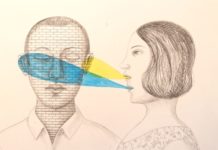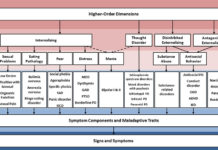Antidepressant Use Associated With More Violent Suicide Attempts
A new study found that taking an antidepressant medication was associated with a heightened risk of suicide using violent means.
No Graphic Detail: The Injustice of Being Silenced
They tell us we’re too fragile to speak our own truth, and that those around us are too fragile to hear it. If you must name what happened to you, at least slap a “trigger warning” on yourself, and don’t “paint a picture.” Fuck that. The truth is that graphic detail can make some of us stronger in a way that silence never could.
Antidepressants and the National Suicide Epidemic
We encourage young people to see themselves as fragile creatures whose brains can go haywire for any reason, or no reason at all. Then we tell them they have the “disease” of depression and ply them with drugs with a known link to worsening depression and suicidality going back for decades. How many more will have to die before this changes?
How “Safe Messaging” Gaslights Suicidal People
Suicide prevention constructs a reality in which the problems of suicide lie within suicidal people. Sanity is constructed around wanting to live, insanity around wanting to die. Within this paradigm, the suicidal person can never be trusted. They are fragile, vulnerable, demanding protection, surveillance, and management.
Being-Towards-Suicide
Is it not the very capacity for suicide that makes us human? This capacity, this freedom, of autonomy’s jurisdiction to extend to the outermost seconds of life, namely death, is an innate part of humanity and thus consciousness. Accepting death as a possibility embraces the finitude of our existence.
Against the Odds: ‘Unimproved Schizophrenic’ to Yale PhD
Forty years after I had first been admitted to the hospital, I was ready to confront my past. So, I sent for my hospital records, and I read them. As an experienced clinician, I recognized immediately what the doctors hadn’t been able to see in 1960: my problem wasn’t ‘schizophrenia’ but PTSD, connected with incest.
Psychotropic Medications Serve as Powerful Tools for U.S. Military, Imperialism
Ethnographic research sheds light on extensive psychopharmaceutical use by soldiers in post 9/11 U.S. wars.
Teacher Wellbeing Matters for Student Mental Health
Teacher’s personal wellbeing plays a role in students’ mental health outcomes, suggests a new study.
De-Othering “Schizophrenia” by Placing it in Socio-Historical Context
Understanding schizophrenia as a non-enigmatic, understandable human experience goes against a history of institutional “othering” that has sustained psychiatric legitimacy and further marginalized service-users.
Thought About Killing Yourself Lately? It’s Not All In Your Head
As the world economic leader in GDP at $24 trillion per year, the United States has had steadily rising suicide rates for nearly two decades, though when compared to other economic leaders such as France, Germany, Japan, India, the UK and Italy, it remains the outlier; the rest have dropped. Why is the United States unique in its degree of misery?
Increase in Suicide Attempts by Self-Poisoning in Youth
Researchers shed light on hike in attempted suicide by self-poisoning in young adults between 2011 and 2018.
Mobile Apps for Mental Health Lack Transparency in Data Sharing
Research illustrates privacy concerns with how mental health applications collect and share users’ data.
Researchers Find Bias in Industry-Funded Continuing Medical Education
Industry-funded continuing medical education (CME) influences physicians to prescribe more opioids, focus less on the consequences.
The Role of Racial Bias in the Overdiagnosis of Schizophrenia
Researchers detect disparity between white and African American patients diagnosed with schizophrenia when symptoms of a mood disorder are present.
Valuing Posttraumatic Growth in Psychosis
Individuals who experience psychosis can also experience posttraumatic growth, which can be a central component of the recovery paradigm.
More Physical Activity-Based Mental Health Interventions Needed in Schools
What physical activity-based programs are being implemented in schools, how are they being researched, and what kind of impact have they made?
Psychiatrists View Drug-Free Programs for Psychosis as “Unscientific,” Study Finds
A new study provides an insider’s look into how psychiatrists view the establishment of drug-free programs in Norway.
Higher Minimum Wage May Result in Fewer Suicide Deaths, Study Finds
New research suggests that minimum wage laws provide financial security that may help prevent suicide.
International Research Team Proposes a New Taxonomy of Mental Disorders
New data interpreted to suggest a hierarchical, dimensional system of mental disorders will aid future research efforts and improve mental health care.
Debate Ensues Over Rights-Based Approach to Mental Health
Debate ensues as scholars and policymakers discuss how to bring a rights-based approach to mental health policy.
When Does it Help to Have Background Information in Child-Centered Play Therapy?
Knowing the client’s history can help foster genuine empathic responding, a key component to child-centered play therapy.
Green Space in Childhood May Protect Against Adult Mental Health Issues
A new study suggests proximity to green space as a child is linked to lower rates of mental health issues in adulthood.
Increasing Prevalence of Mood Disorders Among Teens and Young Adults
Depression, serious psychological distress, and suicide attempts have risen substantially since the early 2000s among young adults – what’s changed?
The Role of Context, Language, and Meaning in Hearing Voices
Sociocultural context, language, and sense-making process are among concepts that can help hearers and providers better understand the phenomenon of hearing voices
First-Person Accounts of Madness and Global Mental Health: An Interview with Dr. Gail Hornstein
Dr. Gail Hornstein, author of Agnes’s Jacket: A Psychologist’s Search for the Meanings of Madness, discusses the importance of personal narratives and service-user activism in the context of the global mental health movement.

































